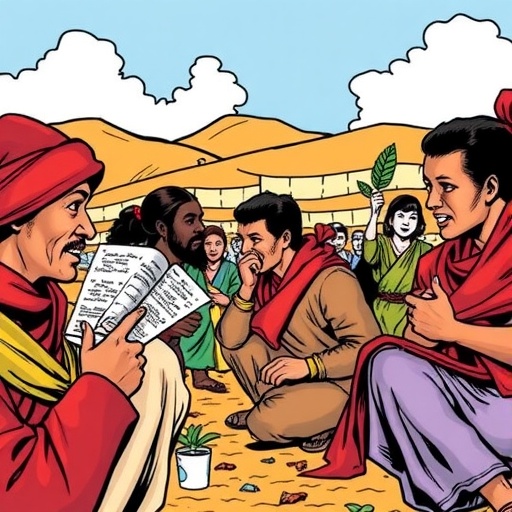In contemporary education, the methodologies through which knowledge is disseminated and absorbed are as diverse as the learners themselves. A groundbreaking study by G.C. de Araujo, featured in the Discovery in Education journal, investigates a unique yet powerful medium: comics. This research specifically explores the formation of awareness and theoretical thinking among peasant students, utilizing the perspective of cultural-historical theory. It’s a fascinating journey into how visual narratives can shape understanding, especially in communities that often face educational disparities.
Comics have long been dismissed as mere entertainment, seen as frivolous reads disconnected from serious discourse. However, de Araujo’s study challenges this perspective by presenting comics as a legitimate tool for fostering critical thinking and awareness of social issues among students. By examining the cognitive processes involved in comic reading, the research sheds light on how these narratives can engage young minds in ways traditional educational practices might not.
The cultural-historical theory provides a robust framework for this study, emphasizing the social contexts in which learning occurs. By integrating this theory, de Araujo highlights how students from peasant backgrounds can extract meaning and relevance from the socio-cultural elements embedded in comic narratives. The findings suggest that these students are not only passive consumers of knowledge; they actively engage with and reinterpret the content, bridging their lived experiences with the stories they read.
One key aspect of the research focuses on the visual literacy that comics demand from readers. Comics require a unique interaction with text and images—readers must decipher visual cues and contextual clues to fully grasp the narrative. This skill is particularly valuable for students who may not have access to extensive literary resources. De Araujo posits that cultivating visual literacy through comics can empower these learners, fostering their critical thinking skills in the process.
Additionally, the study draws attention to the importance of representation in educational materials. For peasant students, seeing themselves reflected in comic narratives can create a strong sense of identity. By featuring characters and stories that resonate with their realities, comics can promote self-awareness and affirm their experiences. This connection can enhance engagement, motivating students to delve deeper into both the content and the underlying theoretical concepts.
The impact of this approach extends beyond individual students. It holds potential for broader educational reforms, advocating for inclusive curricula that recognize and celebrate diverse cultural backgrounds. Incorporating comics into educational practices could pave the way for multi-modal learning environments, where various forms of media work together to enrich student experiences. De Araujo’s findings certainly suggest that adapting educational materials to fit the cultural and social contexts of students can lead to deeper understandings and more relevant learning outcomes.
Moreover, the emotional engagement facilitated by comics cannot be overlooked. Stories have the power to evoke feelings, allowing readers to empathize with characters and the challenges they face. This emotional component is critical in education, as it fosters a deeper connection to content and encourages students to consider multiple perspectives. As de Araujo’s research illustrates, this emotional resonance can serve as a catalyst for fostering awareness of social issues and critical discourse among students.
The study also highlights the collaborative potential of comic creation. Encouraging students to create their own comics can further enhance their understanding of theoretical concepts while providing them with a platform to express their thoughts and perspectives. This participatory approach not only bolsters creativity but also reinforces the idea that students can be active agents in their learning journeys. By producing comics that reflect their realities, students can explore and communicate complex ideas in accessible ways.
As educational institutions grapple with the challenge of engaging diverse student populations, de Araujo’s research offers valuable insights. It demonstrates that by embracing unconventional educational tools like comics, educators can create more inclusive, engaging, and responsive learning environments. This approach can transform the educational landscape for peasant students, equipping them with the skills and awareness necessary to navigate the complexities of their worlds.
Furthermore, the research underscores the necessity of professional development for educators. In order to effectively implement innovative approaches like comic-based learning, teachers must be equipped with the tools and knowledge to integrate these mediums into their curricula. Training programs that focus on visual literacy, cultural responsiveness, and the pedagogical benefits of comics can empower educators to diversify their teaching practices and better support their students.
As we look to the future of education, studies like de Araujo’s remind us of the power of creativity in learning. Comics stand out as a unique medium that can harness students’ interests and transform them into effective educational devices. By capitalizing on this potential, educators can not only enhance engagement but also cultivate a generation of learners who are more aware, empathetic, and connected to the world around them.
In conclusion, de Araujo’s exploration of the intersection between comics and education provides a compelling case for re-evaluating traditional teaching methods. It serves as a call to action for educators and policymakers alike to consider the diverse needs of learners and embrace innovative strategies that foster critical thinking and social awareness. With the potential to revolutionize educational practices, the integration of comics into curricula represents a dynamic approach to nurturing the next generation of thinkers, changemakers, and engaged citizens.
Subject of Research: The formation of awareness and theoretical thinking of a peasant student through comics from the perspective of cultural–historical theory.
Article Title: The formation of the awareness and theoretical thinking of a peasant student through comics from the perspective of cultural–historical theory.
Article References:
de Araujo, G.C. The formation of the awareness and theoretical thinking of a peasant student through comics from the perspective of cultural–historical theory.
Discov Educ 4, 475 (2025). https://doi.org/10.1007/s44217-025-00912-w
Image Credits: AI Generated
DOI: https://doi.org/10.1007/s44217-025-00912-w
Keywords: Comics, education, cultural-historical theory, visual literacy, critical thinking, peasant students.




